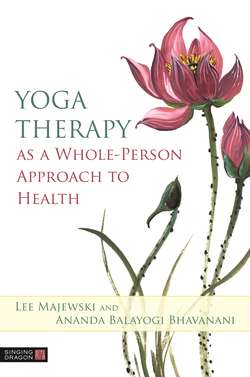Читать книгу Yoga Therapy as a Whole-Person Approach to Health - Lee Majewski - Страница 51
На сайте Литреса книга снята с продажи.
What about spirituality and health?
ОглавлениеMore research has also emerged on spirituality since 2000. Three systematic reviews of academic literature identified more than 3000 empirical studies on spirituality and health.15, 16, 17 One of the obstacles to defining the protocols of research on spirituality is the difficulty of separating spirituality from religion. “Spirituality traditionally was regarded as a core part of religion. However in [the] last decades spirituality definition became much broader,” writes Harold Koenig.18 On the other hand, the general population at large still regards spirituality exclusively as an inherent part of religion. This is reflected in the following. The WHO wanted to modify its 1948 definition of health—“Health is a state of complete physical, mental and social well-being and not merely the absence of disease”—and add “spiritual wellbeing.” However, due to many protests, the definition stayed as it had originally been created.
There are many proposed new definitions of spirituality that attempt to separate it from religion. In their review article, Alexander Moreira-Almeida and colleagues19 propose the following division between spirituality and religion:
• “Spirituality is a personal quest for understanding answers to ultimate questions about life, about meaning and about relationship to the sacred or transcendent [which may or may not be connected to religion or religious community].”
• “Religion is an organized system of beliefs, practices, rituals and symbols designed to facilitate closeness to the sacred or transcendent.”
Despite a growing body of research, “the spiritual concerns continue to be one of the most overlooked aspects of research, while the importance of physical and psychological factors are routinely acknowledged.”20 In a critical review on coping with heart failure, Clark and Hunter propose, “spirituality is expressed through beliefs, values, traditions, and practices.”21 They further stress that “the quantitative evidence also confirms that spiritual needs and/or distress contribute to greater individuals’ experiences of suffering.”
On the other hand, addressing aspects of spiritual wellbeing, a study by McCabe and colleagues found significant improvements in pain intensity, physical function, mood, and cognitive function.22
In 2015, Koenig23 published a systematic and thorough review of quantitative research in which he studied findings from over 3000 studies of the effects of religion and spirituality on mental health, health behaviors, and physical health. All 3000 were positively affected by spirituality and religion. It will be exciting to see the results of a new and as yet unpublished study conducted by Duke University in the US examining the effects of religiosity on the length of telomeres (related to the process of wear and tear of the body).
Emerging research confirms the connection between spirituality and lives, our physical, emotional, and mental wellbeing and functioning. Yet spirituality continues to be so closely related to religiosity that it is often used synonymously. In our opinion, although religion and yoga both strive to lead humanity into spiritual transformation, there is a significant difference between the two. Religion demands faith as it is based on dogma passed down from “authority.” That is its starting point. On the other hand, yoga is entirely existential, experiential, and experimental. “Yoga is known through yoga. Yoga arises from yoga.”24 It has to be lived, experienced, and experimented with, with the helping hand of a teacher. Yoga depends on testing hypotheses in experience and in this sense it is scientific, even though the domains of that experience extend beyond the objectively measurable.
But is there any difference in the effects of religiosity and spirituality on our health factors? This was the question Daaleman and colleagues25 considered when they looked at 277 geriatric outpatients living in the community and the interaction between religion, spirituality, and the perception of health status. Interestingly, the results showed that there is a difference. The findings confirmed that greater spirituality, but not greater religiosity, is correlated with patients’ appraisal of good health. So higher spirituality, but not necessarily religiosity, means better health. It also confirmed that we perceive ourselves as healthier when we are more spiritual.
